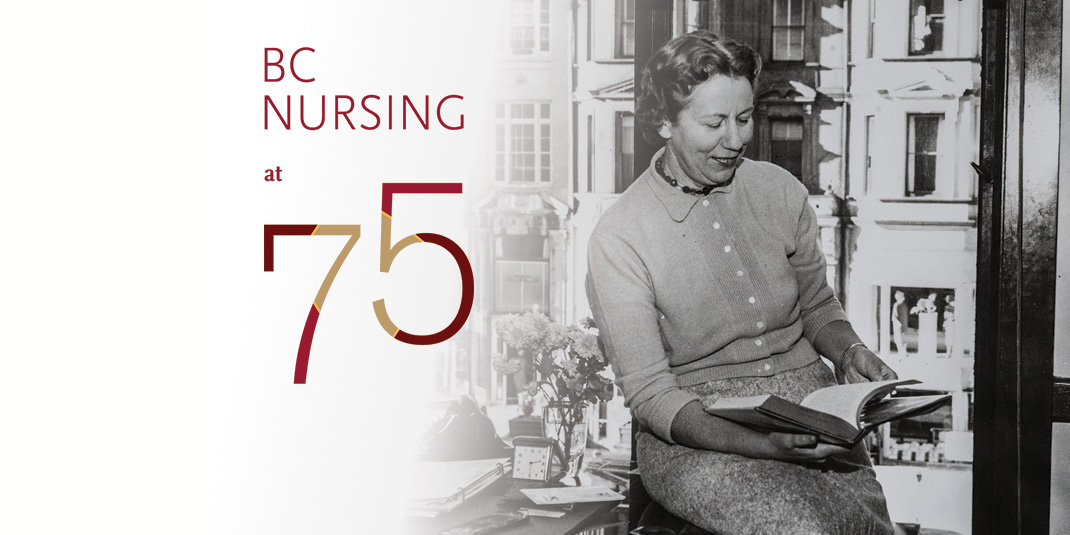


A timeline
At the urging of Richard Cardinal Cushing, archbishop of Boston, the Jesuit Superior General in Rome approves a request that Boston College open a school of nursing to meet a growing need to staff Catholic hospitals and clinics. In a letter to the Jesuit provincial, BC President William Keleher, S.J., sums up the archbishop’s stance: “He will not take ‘no.’”
The Boston College School of Nursing officially begins classes at Boston College Intown Center, housed at 126 Newbury Street. Led by Dean Mary Ann Maher, the school’s first class is made up of 35 “graduate nurses” who have already completed two-year training programs. Several of these women enroll on the G.I. Bill after serving as nurses in World War II.
Twenty-seven high school graduates join the baccalaureate program. Students embark on clinical placements at hospitals in Boston, Lowell, Fall River, Worcester, and Springfield, commuting to Chestnut Hill once a week for labs in chemistry and biology. Barred from writing for The Heights because of their gender, they founded their own newspaper, The Co-Edition.
The school’s first full-time faculty member, Rita Kelleher, is appointed its second dean. Beloved for her advocacy for nurses and women—and her regular faculty-student teas—Kelleher steers the school through its formative years.
Thirty-three graduate nurses walk at Commencement, becoming the school’s first graduates. Excluded from BC’s Sub Turri yearbook, students begin to publish their own yearbook—The Camillian, named for Camillus de Lellis, patron saint of nurses.
The School of Nursing’s first four male students graduate from the two-year Graduate Nurse program.
The School of Nursing establishes its master’s program.
The school moves into a new building on the Chestnut Hill Campus, named Cushing Hall in honor of a record-setting donation from Cardinal Cushing.
Rita Kelleher steps down as dean after 20 years of service. Reflecting on the school’s progress, she tells The Heights: “They keep saying that there is something different about our students. I believe that it is their commitment to nursing.” She continues to teach at BC until 1973.
Boston College becomes the first Jesuit university to offer a Ph.D. program in nursing.
The school’s library outgrows its home on the top floor of Cushing Hall and moves to O’Neill Library. Today, the collection houses more than 60,000 books.
The School of Nursing’s Global Health Initiative begins with a service trip to Ecuador. Since then, hundreds of nursing students have gone on clinical service trips to countries including Chile, the Dominican Republic, France, Haiti, Nicaragua, and Switzerland.
The school is renamed the William F. Connell School of Nursing (CSON), in honor of a $10 million gift from 1959 BC graduate and longtime University benefactor William F. Connell.
The Connell School launches the Keys to Inclusive Leadership in Nursing (KILN) program, which advances equity in nursing by providing financial support, faculty mentorship, and networking opportunities to more than 60 students each year.
CSON establishes the biannual Pinnacle Lecture Series to bring distinguished nurses and nurse researchers to campus.
After nearly six decades in Cushing Hall, the Connell School moves down the hill into a new home in Maloney Hall.
CSON welcomes the first cohort of students to the Doctor of Nursing Practice Program.
As COVID-19 sends the nation into lockdown, faculty, students, and alumni work overtime to staff overburdened hospitals and clinics and keep the BC community safe. At the peak of the PPE shortage, CSON donates equipment from its own labs to local health care centers.
The Connell School of Nursing celebrates 75 years of educating nurse leaders.